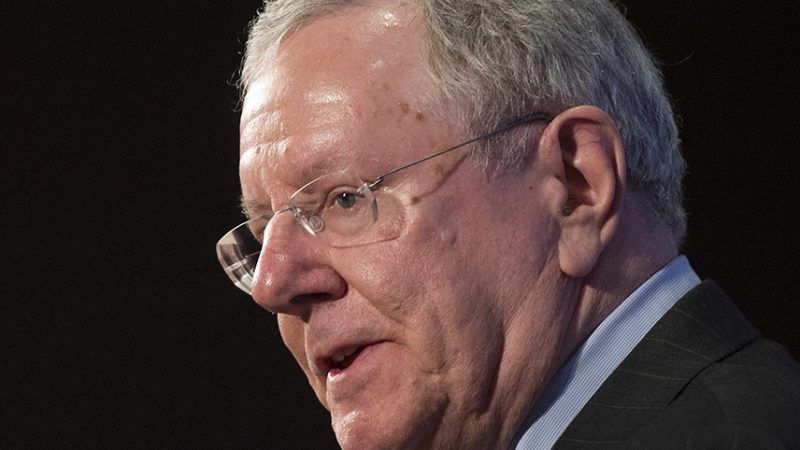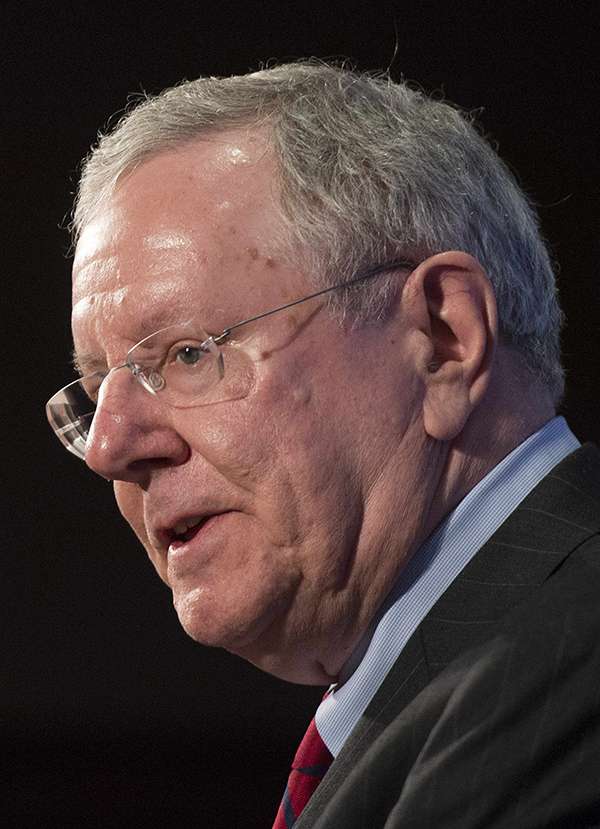Steve Forbes Talks Shop


A hundred years ago, financial columnist B.C. Forbes started an eponymous business magazine. In 2017, his grandson, the erstwhile Republican presidential hopeful and Forbes editor in chief, is overseeing the publication's centenary while celebrating his own 70th birthday. This summer at Freedom Fest in Las Vegas, Reason's Nick Gillespie sat down with Steve Forbes to discuss the past, present, and future of his family's financial mag and American politics as a whole.
Q: What is the essential role that Forbes magazine plays?
A: I think we're unique from other business publications, and this is one of the reasons entrepreneurs around the world identify with Forbes. We don't see business as evil. We don't see them as miscreants having to be sat on lest they wreck the world and kill all of us with pollution and bad dog food. We see it as a noble undertaking. And yes, human beings being what they are, some are going to go off the rails. To [my grandfather], what we call "entrepreneurial capitalism" today is how you enable people to do great things, be creative, learn from your mistakes. And if you're doing well, you make other people better.
Q: Are you optimistic about the next 100 years?
A: Yes. Despite two world wars, the Great Depression, 9/11, all the catastrophes, inflation in the 1970s, the disaster of 2008–2009—by the way, all of these disasters have their roots in government. It's not that markets are inherently unstable. Governments are inherently unstable.
But when you look at all of that, look how far we've come. In the last 30 years, people living in dire poverty—down half as the world has become more integrated. Look at longevity. No big deal these days if people live into their 80s or 90s. Another little factoid: people dying from natural disasters—down 98 percent.
Q: Rate the Donald Trump presidency.
A: We used to grade mutual funds A through F for performance, but right now he hasn't completed a year yet, so I would give him an incomplete.
Q: Where is he falling short?
A: Despite all the good stuff on regulations and getting [Supreme Court Justice Neil] Gorsuch through, [he's falling short on] three big things. One is health care. You can't build Rome in a day, but there's some basics they've gotta get done to create a more patient-oriented system.
Q: And the second thing?
A: They're not going to get tax reform. I think the body snatchers got [House Speaker] Paul Ryan. He came up with this crazy 20 percent border sales tax. Just make across-the-board rate cuts like Reagan did. After next year's election, go to something like a flat tax. Meanwhile, if you get the rates down, it'll have a positive ripple effect throughout the economy. One of the things I hope they realize is, they're gonna be accused of pandering to the rich. Get over it. When the economy starts to have real life, nobody cares.
And then on money. Sound money. Stable money. We have 16 ounces in a pound, 12 inches in a foot, 60 minutes in an hour. No one would suggest we change that to stimulate the economy. Money, the measure of value, is worthless in and of itself, but because of trust we use it to do huge, complicated transactions every day.
Q: But we are not going to a gold standard.
A: No, but in the meantime, don't manipulate the currency. No more zero interest rates. These free marketeers say, "Price controls are bad!" But when the Fed does it, "Oh, that's necessary." One thing we've got to hammer home hard is [that] economies are not machines. They are people. The idea that you can guide economies like a pedal in a car is preposterous.
This interview has been condensed and edited for style and clarity. For a video version, visit reason.com.
This article originally appeared in print under the headline "Steve Forbes Talks Shop."
Editor's Note: As of February 29, 2024, commenting privileges on reason.com posts are limited to Reason Plus subscribers. Past commenters are grandfathered in for a temporary period. Subscribe here to preserve your ability to comment. Your Reason Plus subscription also gives you an ad-free version of reason.com, along with full access to the digital edition and archives of Reason magazine. We request that comments be civil and on-topic. We do not moderate or assume any responsibility for comments, which are owned by the readers who post them. Comments do not represent the views of reason.com or Reason Foundation. We reserve the right to delete any comment and ban commenters for any reason at any time. Comments may only be edited within 5 minutes of posting. Report abuses.
Please to post comments


A. Thinks tax cuts are great, but never mentions spending cuts. Even if he actually does believe those tax cuts will stimulate the economy so much that tax revenue will increase more and reduce the deficit, he's a damned fool if he thinks Congress won't just find more to spend. I'd rather have spending cuts and tax increases than vice verse.
B. I stay away from anything at forbes.com. Their javascript wants to do too much and know too much.